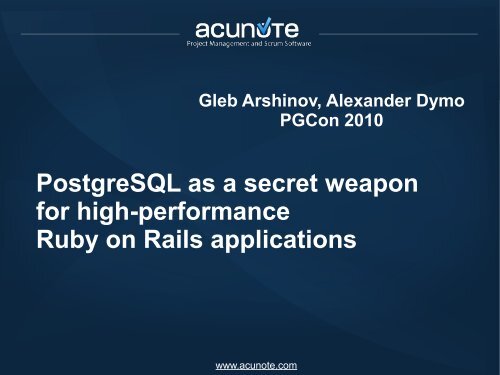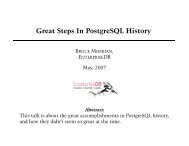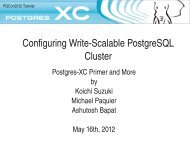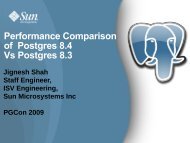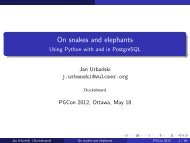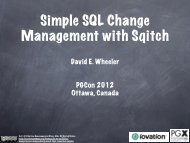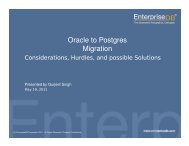PostgreSQL as a secret weapon for high-performance ... - PGCon
PostgreSQL as a secret weapon for high-performance ... - PGCon
PostgreSQL as a secret weapon for high-performance ... - PGCon
Create successful ePaper yourself
Turn your PDF publications into a flip-book with our unique Google optimized e-Paper software.
Gleb Arshinov, Alexander Dymo<br />
<strong>PGCon</strong> 2010<br />
<strong>PostgreSQL</strong> <strong>as</strong> a <strong>secret</strong> <strong>weapon</strong><br />
<strong>for</strong> <strong>high</strong>-per<strong>for</strong>mance<br />
Ruby on Rails applications<br />
www.acunote.com
About<br />
Gleb Arshinov, CEO, gleb@pluron.com<br />
Alexander Dymo, Director of Engineering, adymo@pluron.com<br />
Acunote www.acunote.com<br />
Online project management and Scrum software<br />
~7000 customers<br />
Hosted on Own Servers<br />
Hosted on Customer's Servers<br />
nginx + mongrel<br />
<strong>PostgreSQL</strong> 8.4<br />
Gleb Arshinov & Alex Dymo ● <strong>PostgreSQL</strong> <strong>as</strong> a <strong>secret</strong> <strong>weapon</strong> <strong>for</strong> <strong>high</strong>-per<strong>for</strong>mance Ruby on Rails applications ● <strong>PGCon</strong> 2010 2 / 58
Web Development Pains<br />
●<br />
Per<strong>for</strong>mance<br />
●<br />
Data integrity<br />
●<br />
Developer productivity<br />
Gleb Arshinov & Alex Dymo ● <strong>PostgreSQL</strong> <strong>as</strong> a <strong>secret</strong> <strong>weapon</strong> <strong>for</strong> <strong>high</strong>-per<strong>for</strong>mance Ruby on Rails applications ● <strong>PGCon</strong> 2010 3 / 58
Types of Web Apps<br />
●<br />
Web apps range from Digg to a custom accounting system<br />
●<br />
Your app is somewhere in between<br />
Gleb Arshinov & Alex Dymo ● <strong>PostgreSQL</strong> <strong>as</strong> a <strong>secret</strong> <strong>weapon</strong> <strong>for</strong> <strong>high</strong>-per<strong>for</strong>mance Ruby on Rails applications ● <strong>PGCon</strong> 2010 4 / 58
Outline<br />
●<br />
Rails <strong>as</strong> ORM<br />
●<br />
Optimizing Rails With <strong>PostgreSQL</strong><br />
●<br />
●<br />
●<br />
<strong>PostgreSQL</strong> Limitations<br />
<strong>PostgreSQL</strong> Approaches<br />
Optimizing Datab<strong>as</strong>e<br />
Gleb Arshinov & Alex Dymo ● <strong>PostgreSQL</strong> <strong>as</strong> a <strong>secret</strong> <strong>weapon</strong> <strong>for</strong> <strong>high</strong>-per<strong>for</strong>mance Ruby on Rails applications ● <strong>PGCon</strong> 2010 5 / 58
Rails <strong>as</strong> ORM > Myths and Realities<br />
Myth: not close to SQL<br />
Gleb Arshinov & Alex Dymo ● <strong>PostgreSQL</strong> <strong>as</strong> a <strong>secret</strong> <strong>weapon</strong> <strong>for</strong> <strong>high</strong>-per<strong>for</strong>mance Ruby on Rails applications ● <strong>PGCon</strong> 2010 6 / 58
Rails <strong>as</strong> ORM > Myths and Realities<br />
Close to SQL:<br />
author = Author.find(:first)<br />
select * from authors limit 1;<br />
articles = author.articles<br />
select * from articles where author_id = 1<br />
author_name = “Orwell”<br />
author = Author.find(:all, :conditions => [“name = ?”,<br />
author_name])<br />
select * from authors where name = “Orwell”<br />
Drop down to SQL e<strong>as</strong>ily:<br />
author = Author.find_by_sql(“select * from authors<br />
where authors.birthday > now()”)<br />
Gleb Arshinov & Alex Dymo ● <strong>PostgreSQL</strong> <strong>as</strong> a <strong>secret</strong> <strong>weapon</strong> <strong>for</strong> <strong>high</strong>-per<strong>for</strong>mance Ruby on Rails applications ● <strong>PGCon</strong> 2010 7 / 58
Rails <strong>as</strong> ORM > Attribute Preloading<br />
The conventional Rails way is not so bad:<br />
T<strong>as</strong>ks Tags T<strong>as</strong>ks_Tags<br />
id serial id serial tag_id integer<br />
name varchar name varchar t<strong>as</strong>k_id integer<br />
t<strong>as</strong>ks = T<strong>as</strong>k.find(:all, :include => :tags)<br />
select * from t<strong>as</strong>ks<br />
select * from tags inner join t<strong>as</strong>ks_tags<br />
on tags.id = t<strong>as</strong>ks_tags.tag_id<br />
where t<strong>as</strong>ks_tags.t<strong>as</strong>k_id in (1,2,3,..)<br />
Gleb Arshinov & Alex Dymo ● <strong>PostgreSQL</strong> <strong>as</strong> a <strong>secret</strong> <strong>weapon</strong> <strong>for</strong> <strong>high</strong>-per<strong>for</strong>mance Ruby on Rails applications ● <strong>PGCon</strong> 2010 8 / 58
Rails <strong>as</strong> ORM > Multiplying Queries<br />
create table T<strong>as</strong>k (<br />
id serial not null,<br />
parent_id integer<br />
)<br />
But cl<strong>as</strong>sical ORM problem exists:<br />
cl<strong>as</strong>s T<strong>as</strong>k < ActiveRecord::B<strong>as</strong>e<br />
acts_<strong>as</strong>_tree<br />
end<br />
Uses N+1 datab<strong>as</strong>e queries to load N nodes from the tree:<br />
(root)<br />
select * from t<strong>as</strong>ks where parent_id = nil<br />
- 1 select * from t<strong>as</strong>ks where parent_id = 1<br />
- 11 select * from t<strong>as</strong>ks where parent_id = 11<br />
- 111 select * from t<strong>as</strong>ks where parent_id = 111<br />
- 112 select * from t<strong>as</strong>ks where parent_id = 112<br />
- 12 select * from t<strong>as</strong>ks where parent_id = 12<br />
- 2 select * from t<strong>as</strong>ks where parent_id = 2<br />
- 21 select * from t<strong>as</strong>ks where parent_id = 21<br />
Gleb Arshinov & Alex Dymo ● <strong>PostgreSQL</strong> <strong>as</strong> a <strong>secret</strong> <strong>weapon</strong> <strong>for</strong> <strong>high</strong>-per<strong>for</strong>mance Ruby on Rails applications ● <strong>PGCon</strong> 2010 9 / 58
Rails <strong>as</strong> ORM > Multiplying Queries<br />
create table T<strong>as</strong>k (<br />
id serial not null,<br />
parent_id integer<br />
)<br />
cl<strong>as</strong>s T<strong>as</strong>k < ActiveRecord::B<strong>as</strong>e<br />
acts_<strong>as</strong>_tree<br />
end<br />
Should rather be:<br />
select * from t<strong>as</strong>ks<br />
left outer join<br />
(select id <strong>as</strong> parents_id, parent_id <strong>as</strong> parents_parent_id from t<strong>as</strong>ks)<br />
<strong>as</strong> parents on (t<strong>as</strong>ks.parent_id = parents_id)<br />
left outer join<br />
(select id <strong>as</strong> parents_parents_id from t<strong>as</strong>ks)<br />
<strong>as</strong> parents_parents on (parents_parent_id = parents_parents_id)<br />
Gleb Arshinov & Alex Dymo ● <strong>PostgreSQL</strong> <strong>as</strong> a <strong>secret</strong> <strong>weapon</strong> <strong>for</strong> <strong>high</strong>-per<strong>for</strong>mance Ruby on Rails applications ● <strong>PGCon</strong> 2010 10 / 58
Rails <strong>as</strong> ORM > Generating Queries<br />
4<br />
1<br />
2<br />
1. T<strong>as</strong>k tree (3 levels) (+2 joins & 1 subselect)<br />
2. T<strong>as</strong>k tags (+2 subselects)<br />
3. T<strong>as</strong>k property counters (+4 subselects)<br />
4. L<strong>as</strong>t "timecell" values (+4 joins to get group-wise maximum)<br />
etc... - 12 joins and subselects<br />
3<br />
Gleb Arshinov & Alex Dymo ● <strong>PostgreSQL</strong> <strong>as</strong> a <strong>secret</strong> <strong>weapon</strong> <strong>for</strong> <strong>high</strong>-per<strong>for</strong>mance Ruby on Rails applications ● <strong>PGCon</strong> 2010 11 / 58
Rails <strong>as</strong> ORM > Generating Queries<br />
All this done in 1 query in under 60ms even on EeePC!<br />
Equivalent Ruby code took up to 8 sec!<br />
133x!<br />
Gleb Arshinov & Alex Dymo ● <strong>PostgreSQL</strong> <strong>as</strong> a <strong>secret</strong> <strong>weapon</strong> <strong>for</strong> <strong>high</strong>-per<strong>for</strong>mance Ruby on Rails applications ● <strong>PGCon</strong> 2010 12 / 58
Rails <strong>as</strong> ORM > Query Tests<br />
rev 834: Show p<strong>as</strong>t and future sprints in the list<br />
--- application_helper.rb<br />
+++ application_helper.rb<br />
@@ -456,8 +456,8 @@<br />
sprints = []<br />
sprints.concat current_project.sprints(:present)<br />
+sprints.concat current_project.sprints(:p<strong>as</strong>t)<br />
+sprints.concat current_project.sprints(:future)<br />
Gleb Arshinov & Alex Dymo ● <strong>PostgreSQL</strong> <strong>as</strong> a <strong>secret</strong> <strong>weapon</strong> <strong>for</strong> <strong>high</strong>-per<strong>for</strong>mance Ruby on Rails applications ● <strong>PGCon</strong> 2010 13 / 58
Rails <strong>as</strong> ORM > Query Tests<br />
rev 834: Show p<strong>as</strong>t and future sprints in the list<br />
--- application_helper.rb<br />
+++ application_helper.rb<br />
@@ -456,8 +456,8 @@<br />
sprints = []<br />
sprints.concat current_project.sprints(:present)<br />
+sprints.concat current_project.sprints(:p<strong>as</strong>t)<br />
+sprints.concat current_project.sprints(:future)<br />
Be<strong>for</strong>e<br />
After<br />
Sprint 20 x (1+5) (C) 0.87 ± 0.01 0.88 ± 0.01<br />
Gleb Arshinov & Alex Dymo ● <strong>PostgreSQL</strong> <strong>as</strong> a <strong>secret</strong> <strong>weapon</strong> <strong>for</strong> <strong>high</strong>-per<strong>for</strong>mance Ruby on Rails applications ● <strong>PGCon</strong> 2010 14 / 58
Rails <strong>as</strong> ORM > Query Tests<br />
rev 834: Show p<strong>as</strong>t and future sprints in the list<br />
--- application_helper.rb<br />
+++ application_helper.rb<br />
@@ -456,8 +456,8 @@<br />
sprints = []<br />
sprints.concat current_project.sprints(:present)<br />
+sprints.concat current_project.sprints(:p<strong>as</strong>t)<br />
+sprints.concat current_project.sprints(:future)<br />
--- empty_controller_test.rb<br />
+++ empty_controller_test.rb<br />
@@ -79,11 +79,12 @@<br />
"Sprint Load",<br />
+ "Sprint Load",<br />
+ "Sprint Load",<br />
"common/_nav_dialog",<br />
"Project Load",<br />
Gleb Arshinov & Alex Dymo ● <strong>PostgreSQL</strong> <strong>as</strong> a <strong>secret</strong> <strong>weapon</strong> <strong>for</strong> <strong>high</strong>-per<strong>for</strong>mance Ruby on Rails applications ● <strong>PGCon</strong> 2010 15 / 58
Rails <strong>as</strong> ORM > Query Tests<br />
Query tests to make sure we don't fall into the<br />
multiplying queries trap<br />
def test_queries<br />
queries = track_queries do<br />
get :index<br />
end<br />
<strong>as</strong>sert_equal queries, [<br />
"T<strong>as</strong>k Load",<br />
"Tag Load",<br />
"Event Create",<br />
"SQL"<br />
]<br />
end<br />
Gleb Arshinov & Alex Dymo ● <strong>PostgreSQL</strong> <strong>as</strong> a <strong>secret</strong> <strong>weapon</strong> <strong>for</strong> <strong>high</strong>-per<strong>for</strong>mance Ruby on Rails applications ● <strong>PGCon</strong> 2010 16 / 58
Rails <strong>as</strong> ORM > Query Tests<br />
module ActiveSupport<br />
cl<strong>as</strong>s BufferedLogger<br />
attr_reader :tracked_queries<br />
def tracking=(val)<br />
@tracked_queries = []<br />
@tracking = val<br />
end<br />
def add_with_tracking(severity, message = nil, progname = nil, &block)<br />
@tracked_queries
Rails <strong>as</strong> ORM > Migrations<br />
Use SQL DDL not Rails DSL<br />
(unless targeting multiple RDBMS)<br />
Schema in SQL vs Rails parlance<br />
Migration in SQL<br />
Migration in Rails parlance<br />
execute "<br />
create table Foo (<br />
id serial not null,<br />
name varchar(20),<br />
bar_id integer,<br />
"<br />
);<br />
primary key (id),<br />
<strong>for</strong>eign key (bar_id)<br />
references Bar (id)<br />
create_table :foo do |t|<br />
t.string :name, :limit => 20<br />
t.references :bar<br />
end<br />
execute "alter table foo add<br />
<strong>for</strong>eign key (bar_id)<br />
references Bar (id)"<br />
Gleb Arshinov & Alex Dymo ● <strong>PostgreSQL</strong> <strong>as</strong> a <strong>secret</strong> <strong>weapon</strong> <strong>for</strong> <strong>high</strong>-per<strong>for</strong>mance Ruby on Rails applications ● <strong>PGCon</strong> 2010 18 / 58
Rails <strong>as</strong> ORM > Data Integrity<br />
●<br />
Myth - rails does not support constraints<br />
●<br />
Actually not possible to <strong>as</strong>sure data integrity in Rails<br />
●<br />
●<br />
Use constraints, rules, triggers and other datab<strong>as</strong>e magic to<br />
protect data integrity, not to implement business logic<br />
FK constraints -- everything should be RESTRICT<br />
ON X SET NULL and CASCADE is a problem<br />
Gleb Arshinov & Alex Dymo ● <strong>PostgreSQL</strong> <strong>as</strong> a <strong>secret</strong> <strong>weapon</strong> <strong>for</strong> <strong>high</strong>-per<strong>for</strong>mance Ruby on Rails applications ● <strong>PGCon</strong> 2010 19 / 58
Outline<br />
●<br />
Rails <strong>as</strong> ORM<br />
●<br />
Optimizing Rails with <strong>PostgreSQL</strong><br />
●<br />
●<br />
●<br />
<strong>PostgreSQL</strong> Limitations<br />
<strong>PostgreSQL</strong> Approaches<br />
Optimizing Datab<strong>as</strong>e<br />
Gleb Arshinov & Alex Dymo ● <strong>PostgreSQL</strong> <strong>as</strong> a <strong>secret</strong> <strong>weapon</strong> <strong>for</strong> <strong>high</strong>-per<strong>for</strong>mance Ruby on Rails applications ● <strong>PGCon</strong> 2010 20 / 58
Rails Per<strong>for</strong>mance > Ruby<br />
●<br />
Good language, bad implementation<br />
●<br />
Slow<br />
●<br />
●<br />
Unreliable<br />
Deal with it!<br />
Gleb Arshinov & Alex Dymo ● <strong>PostgreSQL</strong> <strong>as</strong> a <strong>secret</strong> <strong>weapon</strong> <strong>for</strong> <strong>high</strong>-per<strong>for</strong>mance Ruby on Rails applications ● <strong>PGCon</strong> 2010 21 / 58
Rails Per<strong>for</strong>mance > Ruby<br />
Compare to the datab<strong>as</strong>e:<br />
<strong>PostgreSQL</strong>:<br />
explain analyze select sin(2+2) <strong>as</strong> hard_stuff;<br />
QUERY PLAN<br />
-------------------------------------------------------------------<br />
Result (cost=0.00..0.01 rows=1 width=0)<br />
(actual time=0.001..0.002 rows=1 loops=1)<br />
Total runtime: 0.012 ms<br />
Ruby:<br />
Benchmark.realtime{ sin(2+2) }*1000<br />
> 0.027 ms<br />
13x!<br />
Gleb Arshinov & Alex Dymo ● <strong>PostgreSQL</strong> <strong>as</strong> a <strong>secret</strong> <strong>weapon</strong> <strong>for</strong> <strong>high</strong>-per<strong>for</strong>mance Ruby on Rails applications ● <strong>PGCon</strong> 2010 22 / 58
Rails Per<strong>for</strong>mance > Rails<br />
●<br />
H<strong>as</strong> a reputation of being slow<br />
●<br />
Actually even slower<br />
●<br />
●<br />
●<br />
Most of the time spent in GC<br />
CPU bound<br />
Doesn't parallelize<br />
Gleb Arshinov & Alex Dymo ● <strong>PostgreSQL</strong> <strong>as</strong> a <strong>secret</strong> <strong>weapon</strong> <strong>for</strong> <strong>high</strong>-per<strong>for</strong>mance Ruby on Rails applications ● <strong>PGCon</strong> 2010 23 / 58
Rails Per<strong>for</strong>mance > Per<strong>for</strong>mance Tests<br />
Keep a set of benchmarks <strong>for</strong> most frequent user requests.<br />
For example:<br />
Benchmark Burndown 120 0.70 ± 0.00<br />
Benchmark Inc. Burndown 120 0.92 ± 0.01<br />
Benchmark Sprint 20 x (1+5) (C) 0.45 ± 0.00<br />
Benchmark Issues 100 (C) 0.34 ± 0.00<br />
Benchmark Prediction 120 0.56 ± 0.00<br />
Benchmark Progress 120 0.23 ± 0.00<br />
Benchmark Sprint 20 x (1+5) 0.93 ± 0.00<br />
Benchmark Timeline 5x100 0.11 ± 0.00<br />
Benchmark Signup 0.77 ± 0.00<br />
Benchmark Export 0.20 ± 0.00<br />
Benchmark Move Here 20/120 0.89 ± 0.00<br />
Benchmark Order By User 0.98 ± 0.00<br />
Benchmark Set Field (EP) 0.21 ± 0.00<br />
Benchmark T<strong>as</strong>k Create + Tag 0.23 ± 0.00<br />
... 30 more ...<br />
Gleb Arshinov & Alex Dymo ● <strong>PostgreSQL</strong> <strong>as</strong> a <strong>secret</strong> <strong>weapon</strong> <strong>for</strong> <strong>high</strong>-per<strong>for</strong>mance Ruby on Rails applications ● <strong>PGCon</strong> 2010 24 / 58
Rails Per<strong>for</strong>mance > Per<strong>for</strong>mance Tests<br />
Benchmarks <strong>as</strong> a special kind of tests:<br />
cl<strong>as</strong>s RenderingTest < ActionController::IntegrationTest<br />
end<br />
def test_sprint_rendering<br />
login_with users(:user), "user"<br />
benchmark :title => "Sprint 20 x (1+5) (C)",<br />
:route => "projects/1/sprints/3/show",<br />
:<strong>as</strong>sert_template => "t<strong>as</strong>ks/index"<br />
end<br />
Benchmark Sprint 20 x (1+5) (C) 0.45 ± 0.00<br />
Gleb Arshinov & Alex Dymo ● <strong>PostgreSQL</strong> <strong>as</strong> a <strong>secret</strong> <strong>weapon</strong> <strong>for</strong> <strong>high</strong>-per<strong>for</strong>mance Ruby on Rails applications ● <strong>PGCon</strong> 2010 25 / 58
Rails Per<strong>for</strong>mance > Per<strong>for</strong>mance Tests<br />
Benchmarks <strong>as</strong> a special kind of tests:<br />
def benchmark(options = {})<br />
(0..100).each do |i|<br />
GC.start<br />
pid = <strong>for</strong>k do<br />
begin<br />
out = File.open("values", "a")<br />
ActiveRecord::B<strong>as</strong>e.transaction do<br />
elapsed_time = Benchmark::realtime do<br />
request_method = options[:post] ? :post : :get<br />
send(request_method, options[:route])<br />
end<br />
out.puts elapsed_time if i > 0<br />
out.close<br />
raise CustomTransactionError<br />
end<br />
rescue CustomTransactionError<br />
exit<br />
end<br />
end<br />
Process::waitpid pid<br />
ActiveRecord::B<strong>as</strong>e.connection.reconnect!<br />
end<br />
values = File.read("values")<br />
print "#{mean(values).to_02f} ± #{sigma(values).to_02f}\n"<br />
end<br />
Gleb Arshinov & Alex Dymo ● <strong>PostgreSQL</strong> <strong>as</strong> a <strong>secret</strong> <strong>weapon</strong> <strong>for</strong> <strong>high</strong>-per<strong>for</strong>mance Ruby on Rails applications ● <strong>PGCon</strong> 2010 26 / 58
Rails Per<strong>for</strong>mance > Solution<br />
Scalability is not a substitute <strong>for</strong> per<strong>for</strong>mance<br />
Gleb Arshinov & Alex Dymo ● <strong>PostgreSQL</strong> <strong>as</strong> a <strong>secret</strong> <strong>weapon</strong> <strong>for</strong> <strong>high</strong>-per<strong>for</strong>mance Ruby on Rails applications ● <strong>PGCon</strong> 2010 27 / 58
Rails Per<strong>for</strong>mance > Solution<br />
Delegate <strong>as</strong> much<br />
work <strong>as</strong> possible<br />
to...<br />
Gleb Arshinov & Alex Dymo ● <strong>PostgreSQL</strong> <strong>as</strong> a <strong>secret</strong> <strong>weapon</strong> <strong>for</strong> <strong>high</strong>-per<strong>for</strong>mance Ruby on Rails applications ● <strong>PGCon</strong> 2010 28 / 58
Rails Per<strong>for</strong>mance > Solution<br />
Delegate <strong>as</strong> much<br />
work <strong>as</strong> possible<br />
to the datab<strong>as</strong>e!<br />
Gleb Arshinov & Alex Dymo ● <strong>PostgreSQL</strong> <strong>as</strong> a <strong>secret</strong> <strong>weapon</strong> <strong>for</strong> <strong>high</strong>-per<strong>for</strong>mance Ruby on Rails applications ● <strong>PGCon</strong> 2010 29 / 58
Rails Per<strong>for</strong>mance > Attribute Preloading<br />
The conventional Rails way:<br />
T<strong>as</strong>ks Tags T<strong>as</strong>ks_Tags<br />
id serial id serial tag_id integer<br />
name varchar name varchar t<strong>as</strong>k_id integer<br />
t<strong>as</strong>ks = T<strong>as</strong>k.find(:all, :include => :tags)<br />
> 0.058 sec<br />
2 SQL queries<br />
select * from t<strong>as</strong>ks<br />
select * from tags inner join t<strong>as</strong>ks_tags<br />
on tags.id = t<strong>as</strong>ks_tags.tag_id<br />
where t<strong>as</strong>ks_tags.t<strong>as</strong>k_id in (1,2,3,..)<br />
Rals creates an object <strong>for</strong> each tag,<br />
that's not f<strong>as</strong>t and takes memory<br />
Gleb Arshinov & Alex Dymo ● <strong>PostgreSQL</strong> <strong>as</strong> a <strong>secret</strong> <strong>weapon</strong> <strong>for</strong> <strong>high</strong>-per<strong>for</strong>mance Ruby on Rails applications ● <strong>PGCon</strong> 2010 30 / 58
Rails Per<strong>for</strong>mance > Attribute Preloading<br />
F<strong>as</strong>ter with Postgres arrays:<br />
T<strong>as</strong>ks Tags T<strong>as</strong>ks_Tags<br />
id serial id serial tag_id integer<br />
name varchar name varchar t<strong>as</strong>k_id integer<br />
t<strong>as</strong>ks = T<strong>as</strong>k.find(:all, :select => "*,<br />
array(select tags.name from tags inner join t<strong>as</strong>ks_tags<br />
on (tags.id = t<strong>as</strong>ks_tags.tag_id)<br />
where t<strong>as</strong>ks_t<strong>as</strong>ks.t<strong>as</strong>k_id=t<strong>as</strong>ks.id) <strong>as</strong> tag_names<br />
")<br />
> 0.018 sec<br />
1 SQL query<br />
Rails doesn't have to create objects<br />
>3x f<strong>as</strong>ter:<br />
(w<strong>as</strong> 0.058 sec, now 0.018 sec) 3x!<br />
Gleb Arshinov & Alex Dymo ● <strong>PostgreSQL</strong> <strong>as</strong> a <strong>secret</strong> <strong>weapon</strong> <strong>for</strong> <strong>high</strong>-per<strong>for</strong>mance Ruby on Rails applications ● <strong>PGCon</strong> 2010 31 / 58
Rails Per<strong>for</strong>mance > Preloading Attributes<br />
F<strong>as</strong>ter with Postgres arrays:<br />
T<strong>as</strong>ks Tags T<strong>as</strong>ks_Tags<br />
id serial id serial tag_id integer<br />
name varchar name varchar t<strong>as</strong>k_id integer<br />
t<strong>as</strong>ks = T<strong>as</strong>k.find(:all, :select => "*,<br />
array(select tags.name from tags inner join t<strong>as</strong>ks_tags<br />
on (tags.id = t<strong>as</strong>ks_tags.tag_id)<br />
where t<strong>as</strong>ks_t<strong>as</strong>ks.t<strong>as</strong>k_id=t<strong>as</strong>ks.id) <strong>as</strong> tag_names<br />
")<br />
puts t<strong>as</strong>ks.first.tag_names<br />
> "{Foo,Bar,Zee}"<br />
Gleb Arshinov & Alex Dymo ● <strong>PostgreSQL</strong> <strong>as</strong> a <strong>secret</strong> <strong>weapon</strong> <strong>for</strong> <strong>high</strong>-per<strong>for</strong>mance Ruby on Rails applications ● <strong>PGCon</strong> 2010 32 / 58
Rails Per<strong>for</strong>mance > Access Control<br />
Simplified model <strong>for</strong> user privilege management:<br />
Users Role Roles_Users<br />
id serial id serial user_id integer<br />
name varchar name varchar role_id integer<br />
privilege1 boolean<br />
privilege2 boolean<br />
...<br />
user = User.find(:first, :include => :roles)<br />
can_do_1 = user.roles.any { |role| role.privilege1? }<br />
Gleb Arshinov & Alex Dymo ● <strong>PostgreSQL</strong> <strong>as</strong> a <strong>secret</strong> <strong>weapon</strong> <strong>for</strong> <strong>high</strong>-per<strong>for</strong>mance Ruby on Rails applications ● <strong>PGCon</strong> 2010 33 / 58
Rails Per<strong>for</strong>mance > Access Control<br />
Simplified model <strong>for</strong> user privilege management:<br />
Users Role Roles_Users<br />
id serial id serial user_id integer<br />
name varchar name varchar role_id integer<br />
privilege1 boolean<br />
privilege2 boolean<br />
...<br />
user = User.find(:first, :include => :roles)<br />
can_do_1 = user.roles.any { |role| role.privilege1? }<br />
Where is the problem?<br />
- 2 SQL queries<br />
- Rails h<strong>as</strong> to create objects <strong>for</strong> each role<br />
- Ruby iterates over the roles array<br />
Gleb Arshinov & Alex Dymo ● <strong>PostgreSQL</strong> <strong>as</strong> a <strong>secret</strong> <strong>weapon</strong> <strong>for</strong> <strong>high</strong>-per<strong>for</strong>mance Ruby on Rails applications ● <strong>PGCon</strong> 2010 34 / 58
Rails Per<strong>for</strong>mance > Access Control<br />
Same in SQL:<br />
Users Role Roles_Users<br />
id serial id serial user_id integer<br />
name varchar name varchar role_id integer<br />
privilege1 boolean<br />
privilege2 boolean<br />
user = User.find(:first, :select => "*",<br />
:joins => "<br />
inner join<br />
(select user_id, bool_or(privilege1) <strong>as</strong> privilege1<br />
from roles_users<br />
inner join roles<br />
on (roles.id = roles_users.role_id)<br />
group by user_id)<br />
<strong>as</strong> roles_users<br />
on (users.id = roles_users.user_id)<br />
"<br />
)<br />
can_do_1 = ActiveRecord::ConnectionAdapters::Column.<br />
value_to_boolean(user.privilege1)<br />
Gleb Arshinov & Alex Dymo ● <strong>PostgreSQL</strong> <strong>as</strong> a <strong>secret</strong> <strong>weapon</strong> <strong>for</strong> <strong>high</strong>-per<strong>for</strong>mance Ruby on Rails applications ● <strong>PGCon</strong> 2010 35 / 58
Rails Per<strong>for</strong>mance > Access Control<br />
Optimization Effect:<br />
can_do_1 = user.roles.any { |role| role.privilege1? }<br />
> 2.1 sec<br />
can_do_1 = ActiveRecord::ConnectionAdapters::Column.<br />
value_to_boolean(user.privilege1)<br />
> 64 msec !!!<br />
Gleb Arshinov & Alex Dymo ● <strong>PostgreSQL</strong> <strong>as</strong> a <strong>secret</strong> <strong>weapon</strong> <strong>for</strong> <strong>high</strong>-per<strong>for</strong>mance Ruby on Rails applications ● <strong>PGCon</strong> 2010 36 / 58
Rails Per<strong>for</strong>mance > Aggregations<br />
Per<strong>for</strong>m calculations and aggregations<br />
on large dat<strong>as</strong>ets in SQL:<br />
real life example:<br />
600 000 data rows, 3-dimensional OLAP cube,<br />
slicing and aggregation:<br />
Ruby:~1 Gb RAM, ~90 sec<br />
SQL: up to 5 sec<br />
Gleb Arshinov & Alex Dymo ● <strong>PostgreSQL</strong> <strong>as</strong> a <strong>secret</strong> <strong>weapon</strong> <strong>for</strong> <strong>high</strong>-per<strong>for</strong>mance Ruby on Rails applications ● <strong>PGCon</strong> 2010 37 / 58
Outline<br />
●<br />
Rails <strong>as</strong> ORM<br />
●<br />
Rails Per<strong>for</strong>mance and <strong>PostgreSQL</strong><br />
●<br />
●<br />
●<br />
<strong>PostgreSQL</strong> Experience<br />
<strong>PostgreSQL</strong> Approaches<br />
Optimizing Datab<strong>as</strong>e<br />
Gleb Arshinov & Alex Dymo ● <strong>PostgreSQL</strong> <strong>as</strong> a <strong>secret</strong> <strong>weapon</strong> <strong>for</strong> <strong>high</strong>-per<strong>for</strong>mance Ruby on Rails applications ● <strong>PGCon</strong> 2010 38 / 58
Postgres Experience > Good Things<br />
Good things about Postgres:<br />
●<br />
SQL standard compliance (and useful non-standard addons)<br />
●<br />
●<br />
●<br />
●<br />
●<br />
●<br />
good documentation<br />
sustainable development<br />
good optimizer and EXPLAIN ANALYZE<br />
a lot of things can be expressed in pure SQLConstraints<br />
referential integrity<br />
deadlock detection<br />
Gleb Arshinov & Alex Dymo ● <strong>PostgreSQL</strong> <strong>as</strong> a <strong>secret</strong> <strong>weapon</strong> <strong>for</strong> <strong>high</strong>-per<strong>for</strong>mance Ruby on Rails applications ● <strong>PGCon</strong> 2010 39 / 58
Postgres Experience > Good Things<br />
Good things that were introduced recently:<br />
●<br />
replication (warm and hot standby, streaming replication)<br />
●<br />
●<br />
●<br />
windowing functions<br />
recursive queries<br />
ordering <strong>for</strong> aggregates<br />
Gleb Arshinov & Alex Dymo ● <strong>PostgreSQL</strong> <strong>as</strong> a <strong>secret</strong> <strong>weapon</strong> <strong>for</strong> <strong>high</strong>-per<strong>for</strong>mance Ruby on Rails applications ● <strong>PGCon</strong> 2010 40 / 58
Postgres Experience > Limitations<br />
And now... limitations<br />
Gleb Arshinov & Alex Dymo ● <strong>PostgreSQL</strong> <strong>as</strong> a <strong>secret</strong> <strong>weapon</strong> <strong>for</strong> <strong>high</strong>-per<strong>for</strong>mance Ruby on Rails applications ● <strong>PGCon</strong> 2010 41 / 58
Postgres Experience > Limit/Offset<br />
Pagination VS Subselects:<br />
select *,<br />
(select count(*) from attachments<br />
where issue_id = issues.id) <strong>as</strong> num_attachments<br />
from issues<br />
limit 100 offset 0;<br />
Limit (cost=0.00..831.22 rows=100 width=143) (actual time=0.050..1.242 rows=100 loops=1)<br />
-> Seq Scan on issues (cost=0.00..2509172.92 rows=301866 width=143)<br />
(actual time=0.049..1.119 rows=100 loops=1)<br />
SubPlan<br />
-> Aggregate (cost=8.27..8.28 rows=1 width=0)<br />
(actual time=0.006..0.006 rows=1 loops=100)<br />
-> Index Scan using attachments_issue_id_idx on attachments<br />
(cost=0.00..8.27 rows=1 width=0) (actual time=0.004..0.004 rows=0 loops=100)<br />
Index Cond: (issue_id = $0)<br />
Total runtime: 1.383 ms<br />
Gleb Arshinov & Alex Dymo ● <strong>PostgreSQL</strong> <strong>as</strong> a <strong>secret</strong> <strong>weapon</strong> <strong>for</strong> <strong>high</strong>-per<strong>for</strong>mance Ruby on Rails applications ● <strong>PGCon</strong> 2010 42 / 58
Postgres Experience > Limit/Offset<br />
Pagination VS Subselects:<br />
select *,<br />
(select count(*) from attachments<br />
where issue_id = issues.id) <strong>as</strong> num_attachments<br />
from issues<br />
limit 100 offset 100;<br />
Limit (cost=831.22..1662.44 rows=100 width=143) (actual time=1.070..7.927 rows=100 loops=1)<br />
-> Seq Scan on issues (cost=0.00..2509172.92 rows=301866 width=143)<br />
(actual time=0.039..7.763 rows=200 loops=1)<br />
SubPlan<br />
-> Aggregate (cost=8.27..8.28 rows=1 width=0)<br />
(actual time=0.034..0.034 rows=1 loops=200)<br />
-> Index Scan using attachments_issue_id_idx on attachments<br />
(cost=0.00..8.27 rows=1 width=0) (actual time=0.032..0.032 rows=0 loops=200)<br />
Index Cond: (issue_id = $0)<br />
Total runtime: 8.065 ms<br />
Gleb Arshinov & Alex Dymo ● <strong>PostgreSQL</strong> <strong>as</strong> a <strong>secret</strong> <strong>weapon</strong> <strong>for</strong> <strong>high</strong>-per<strong>for</strong>mance Ruby on Rails applications ● <strong>PGCon</strong> 2010 43 / 58
Postgres Experience > Limit/Offset<br />
Be careful with subselects:<br />
they are executed limit + offset times!<br />
Use joins to overcome the limitation<br />
Gleb Arshinov & Alex Dymo ● <strong>PostgreSQL</strong> <strong>as</strong> a <strong>secret</strong> <strong>weapon</strong> <strong>for</strong> <strong>high</strong>-per<strong>for</strong>mance Ruby on Rails applications ● <strong>PGCon</strong> 2010 44 / 58
Postgres Experience > in() and Joins<br />
Use any(array ()) instead of in()<br />
to <strong>for</strong>ce subselect and avoid join<br />
explain analyze select * from issues where id in (select issue_id from tags_issues);<br />
QUERY PLAN<br />
-------------------------------------------------------------------------------------------------------------------------------------------------------<br />
Merge IN Join (actual time=0.096..576.704 rows=55363 loops=1)<br />
Merge Cond: (issues.id = tags_issues.issue_id)<br />
-> Index Scan using issues_pkey on issues (actual time=0.027..270.557 rows=229991 loops=1)<br />
-> Index Scan using tags_issues_issue_id_key on tags_issues (actual time=0.051..73.903 rows=70052loops=1)<br />
Total runtime: 605.274 ms<br />
explain analyze select * from issues where id = any( array( (select issue_id from tags_issues) ) );<br />
QUERY PLAN<br />
------------------------------------------------------------------------------------------------------------------------------<br />
Bitmap Heap Scan on issues (actual time=247.358..297.932 rows=55363 loops=1)<br />
Recheck Cond: (id = ANY ($0))<br />
InitPlan<br />
-> Seq Scan on tags_issues (actual time=0.017..51.291 rows=70052 loops=1)<br />
-> Bitmap Index Scan on issues_pkey (actual time=246.589..246.589 rows=70052 loops=1)<br />
Index Cond: (id = ANY ($0))<br />
Total runtime: 325.205 ms<br />
2x!<br />
Gleb Arshinov & Alex Dymo ● <strong>PostgreSQL</strong> <strong>as</strong> a <strong>secret</strong> <strong>weapon</strong> <strong>for</strong> <strong>high</strong>-per<strong>for</strong>mance Ruby on Rails applications ● <strong>PGCon</strong> 2010 45 / 58
Postgres Experience > generate_series()<br />
select * from<br />
(select *, (select min(split_date) from t<strong>as</strong>ks<br />
where t<strong>as</strong>ks.issue_id = issues.id) <strong>as</strong> split_date<br />
from issues where org_id = 2) <strong>as</strong> issues,<br />
(select generate_series(0,10) + date '2010-01-01' <strong>as</strong> date) <strong>as</strong> dates<br />
QUERY PLAN<br />
----------------------------------------------------------------------------------------<br />
Nested Loop (actual time=2.581..2525.798 rows=149666 loops=1)<br />
-> Result (actual time=0.007..0.063 rows=11 loops=1)<br />
-> Bitmap Heap Scan on issues (actual time=2.697..47.756 rows=13606 loops=11)<br />
Recheck Cond: (public.issues.org_id = 2)<br />
-> Bitmap Index Scan on issues_org_id_idx (actual time=1.859..1.859 rows=13607<br />
loops=11)<br />
Index Cond: (public.issues.org_id = 2)<br />
SubPlan 1<br />
-> Aggregate (actual time=0.010..0.010 rows=1 loops=149666)<br />
-> Index Scan using t<strong>as</strong>ks_issue_id_key on t<strong>as</strong>ks (actual time=0.006..0.008<br />
rows=1 loops=149666)<br />
Index Cond: (issue_id = $0)<br />
Total runtime: 2608.891 ms<br />
Gleb Arshinov & Alex Dymo ● <strong>PostgreSQL</strong> <strong>as</strong> a <strong>secret</strong> <strong>weapon</strong> <strong>for</strong> <strong>high</strong>-per<strong>for</strong>mance Ruby on Rails applications ● <strong>PGCon</strong> 2010 46 / 58
Postgres Experience > generate_series()<br />
select * from<br />
(select * from issues<br />
left outer join (<br />
select issue_id, min(split_date) <strong>as</strong> split_date from t<strong>as</strong>ks<br />
where org_id = 2 group by issue_id<br />
) t<strong>as</strong>ks<br />
on (t<strong>as</strong>ks.issue_id = issues.id) where org_id = 2) <strong>as</strong> issues,<br />
(select generate_series(0,10) + date '2010-01-01' <strong>as</strong> date) <strong>as</strong> dates<br />
QUERY PLAN<br />
----------------------------------------------------------------------------------------<br />
Nested Loop (actual time=174.706..831.263 rows=149666 loops=1)<br />
-> Result (actual time=0.006..0.055 rows=11 loops=1)<br />
-> Merge Left Join (actual time=15.885..60.496 rows=13606 loops=11)<br />
Merge Cond: (public.issues.id = public.t<strong>as</strong>ks.issue_id)<br />
-> Sort (actual time=8.048..18.068 rows=13606 loops=11)<br />
-> Bitmap Heap Scan on issues (actual time=2.7..55 rows=13606 loops=1)<br />
Recheck Cond: (org_id = 2)<br />
-> Bitmap Index Scan on issues_org_id_idx (actual time=1.912..1.>><br />
Index Cond: (org_id = 2)<br />
-> Sort (actual time=7.834..15.519 rows=13202 loops=11)<br />
-> H<strong>as</strong>hAggregate (actual time=62.150..71.767 rows=13202 loops=1)<br />
-> Bitmap Heap Scan on t<strong>as</strong>ks (actual time=3.177..41.700 rows=18>><br />
Recheck Cond: (org_id = 2)<br />
-> Bitmap Index Scan on t<strong>as</strong>ks_org_id_idx (actual time=2.50>><br />
Index Cond: (org_id = 2)<br />
Total runtime: 906.146 ms<br />
Gleb Arshinov & Alex Dymo ● <strong>PostgreSQL</strong> <strong>as</strong> a <strong>secret</strong> <strong>weapon</strong> <strong>for</strong> <strong>high</strong>-per<strong>for</strong>mance Ruby on Rails applications ● <strong>PGCon</strong> 2010 47 / 58
Outline<br />
●<br />
Rails <strong>as</strong> ORM<br />
●<br />
Rails Per<strong>for</strong>mance and <strong>PostgreSQL</strong><br />
●<br />
●<br />
●<br />
<strong>PostgreSQL</strong> Limitations<br />
<strong>PostgreSQL</strong> Approaches<br />
Optimizing Datab<strong>as</strong>e<br />
Gleb Arshinov & Alex Dymo ● <strong>PostgreSQL</strong> <strong>as</strong> a <strong>secret</strong> <strong>weapon</strong> <strong>for</strong> <strong>high</strong>-per<strong>for</strong>mance Ruby on Rails applications ● <strong>PGCon</strong> 2010 48 / 58
Postgres Approaches<br />
●<br />
Benchmarking/per<strong>for</strong>mance<br />
●<br />
Distrust vendors<br />
●<br />
●<br />
●<br />
Sane appreciation of commodity hardware<br />
Culture of operations<br />
Rele<strong>as</strong>e management<br />
Gleb Arshinov & Alex Dymo ● <strong>PostgreSQL</strong> <strong>as</strong> a <strong>secret</strong> <strong>weapon</strong> <strong>for</strong> <strong>high</strong>-per<strong>for</strong>mance Ruby on Rails applications ● <strong>PGCon</strong> 2010 49 / 58
Outline<br />
●<br />
Rails <strong>as</strong> ORM<br />
●<br />
Rails Per<strong>for</strong>mance and <strong>PostgreSQL</strong><br />
●<br />
●<br />
●<br />
<strong>PostgreSQL</strong> Experience<br />
<strong>PostgreSQL</strong> Approaches<br />
Optimizing Datab<strong>as</strong>e<br />
Gleb Arshinov & Alex Dymo ● <strong>PostgreSQL</strong> <strong>as</strong> a <strong>secret</strong> <strong>weapon</strong> <strong>for</strong> <strong>high</strong>-per<strong>for</strong>mance Ruby on Rails applications ● <strong>PGCon</strong> 2010 50 / 58
Optimize Datab<strong>as</strong>e > B<strong>as</strong>ics<br />
How to optimize <strong>PostgreSQL</strong>:<br />
explain analyze<br />
explain analyze<br />
explain analyze<br />
...<br />
Gleb Arshinov & Alex Dymo ● <strong>PostgreSQL</strong> <strong>as</strong> a <strong>secret</strong> <strong>weapon</strong> <strong>for</strong> <strong>high</strong>-per<strong>for</strong>mance Ruby on Rails applications ● <strong>PGCon</strong> 2010 51 / 58
Optimize Datab<strong>as</strong>e > Cold DB Tip<br />
EXPLAIN ANALYZE explains everything, but...<br />
... run it also <strong>for</strong> the "cold" datab<strong>as</strong>e state!<br />
Example: complex query which works on 230 000 rows and<br />
does 9 subselects / joins:<br />
cold state: 28 sec, hot state: 2.42 sec<br />
Datab<strong>as</strong>e server restart doesn't help<br />
Need to clear disk cache:<br />
sudo echo 3 | sudo tee /proc/sys/vm/drop_caches<br />
(Linux)<br />
Gleb Arshinov & Alex Dymo ● <strong>PostgreSQL</strong> <strong>as</strong> a <strong>secret</strong> <strong>weapon</strong> <strong>for</strong> <strong>high</strong>-per<strong>for</strong>mance Ruby on Rails applications ● <strong>PGCon</strong> 2010 52 / 58
Optimize Datab<strong>as</strong>e > Shared Datab<strong>as</strong>e<br />
You're competing <strong>for</strong> memory cache on a shared server:<br />
1. two datab<strong>as</strong>es with equal load share the cache<br />
Gleb Arshinov & Alex Dymo ● <strong>PostgreSQL</strong> <strong>as</strong> a <strong>secret</strong> <strong>weapon</strong> <strong>for</strong> <strong>high</strong>-per<strong>for</strong>mance Ruby on Rails applications ● <strong>PGCon</strong> 2010 53 / 58
Optimize Datab<strong>as</strong>e > Shared Datab<strong>as</strong>e<br />
You're competing <strong>for</strong> memory cache on a shared server:<br />
2. one of the datab<strong>as</strong>es gets more load and wins the cache<br />
Gleb Arshinov & Alex Dymo ● <strong>PostgreSQL</strong> <strong>as</strong> a <strong>secret</strong> <strong>weapon</strong> <strong>for</strong> <strong>high</strong>-per<strong>for</strong>mance Ruby on Rails applications ● <strong>PGCon</strong> 2010 54 / 58
Optimize Datab<strong>as</strong>e > Shared Datab<strong>as</strong>e<br />
As a result, your datab<strong>as</strong>e can always be in a "cold" state<br />
and you read data from disk, not from memory!<br />
complex query which works on 230 000 rows and<br />
does 9 subselects / joins:<br />
from disk: 28 sec, from memory: 2.42 sec<br />
Solutions:<br />
optimize <strong>for</strong> IO/cold state<br />
sudo echo 3 | sudo tee /proc/sys/vm/drop_caches<br />
push down SQL conditions<br />
Gleb Arshinov & Alex Dymo ● <strong>PostgreSQL</strong> <strong>as</strong> a <strong>secret</strong> <strong>weapon</strong> <strong>for</strong> <strong>high</strong>-per<strong>for</strong>mance Ruby on Rails applications ● <strong>PGCon</strong> 2010 55 / 58
Optimize Datab<strong>as</strong>e > Postgres Config<br />
# How much memory we have to cache the datab<strong>as</strong>e, RAM_FOR_DATABASE * 3/4<br />
effective_cache_size = MB<br />
# Shared memory to hold data in RAM, RAM_FOR_DATABASE/4<br />
shared_buffers = MB<br />
# Work memory <strong>for</strong> queries (RAM_FOR_DATABASE/max_connections) ROUND DOWN 2^x<br />
work_mem = MB<br />
# Memory <strong>for</strong> vacuum, autovacuum, index creation, RAM/16 ROUND DOWN 2^x<br />
maintenance_work_mem = MB<br />
# To ensure that we don't lose data, always fsync after commit<br />
synchronous_commit = on<br />
# Size of WAL on disk, recommended setting: 16<br />
checkpoint_segments = 16<br />
# WAL memory buffer<br />
wal_buffers = 8MB<br />
# Ensure autovacuum is always turned on<br />
autovacuum = on<br />
# Set the number of concurrent disk I/O operations that <strong>PostgreSQL</strong> expects can be executed simultaneously.<br />
effective_io_concurrency = 4<br />
Gleb Arshinov & Alex Dymo ● <strong>PostgreSQL</strong> <strong>as</strong> a <strong>secret</strong> <strong>weapon</strong> <strong>for</strong> <strong>high</strong>-per<strong>for</strong>mance Ruby on Rails applications ● <strong>PGCon</strong> 2010 56 / 58
Optimize Datab<strong>as</strong>e > Postgres Config<br />
Effect from better configuration:<br />
Query<br />
Default<br />
Settings<br />
Custom<br />
Settings<br />
Effect<br />
Aggregation on a<br />
large dat<strong>as</strong>et<br />
Query with complex<br />
joins and subselects<br />
8205 ms 7685 ms 6%<br />
229 ms 143 ms 38%<br />
Gleb Arshinov & Alex Dymo ● <strong>PostgreSQL</strong> <strong>as</strong> a <strong>secret</strong> <strong>weapon</strong> <strong>for</strong> <strong>high</strong>-per<strong>for</strong>mance Ruby on Rails applications ● <strong>PGCon</strong> 2010 57 / 58
Thanks!<br />
Rails per<strong>for</strong>mance articles and more:<br />
http://blog.pluron.com<br />
Gleb Arshinov<br />
CEO<br />
gleb@pluron.com<br />
Alexander Dymo<br />
Director of Engineering<br />
adymo@pluron.com<br />
Gleb Arshinov & Alex Dymo ● <strong>PostgreSQL</strong> <strong>as</strong> a <strong>secret</strong> <strong>weapon</strong> <strong>for</strong> <strong>high</strong>-per<strong>for</strong>mance Ruby on Rails applications ● <strong>PGCon</strong> 2010 58 / 58


